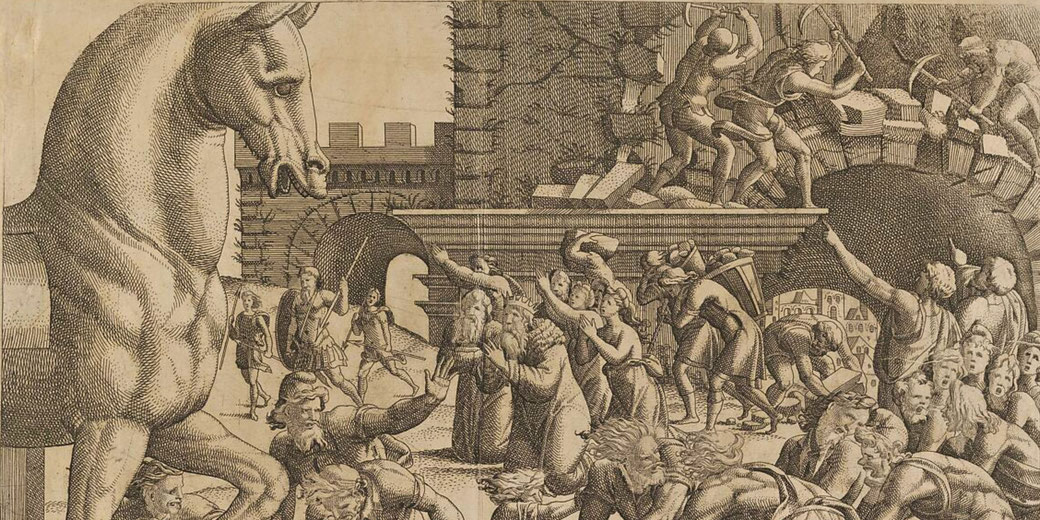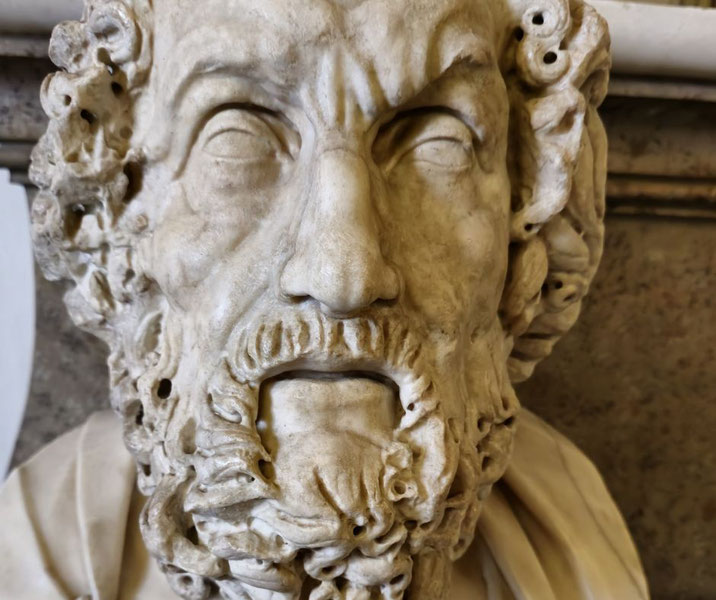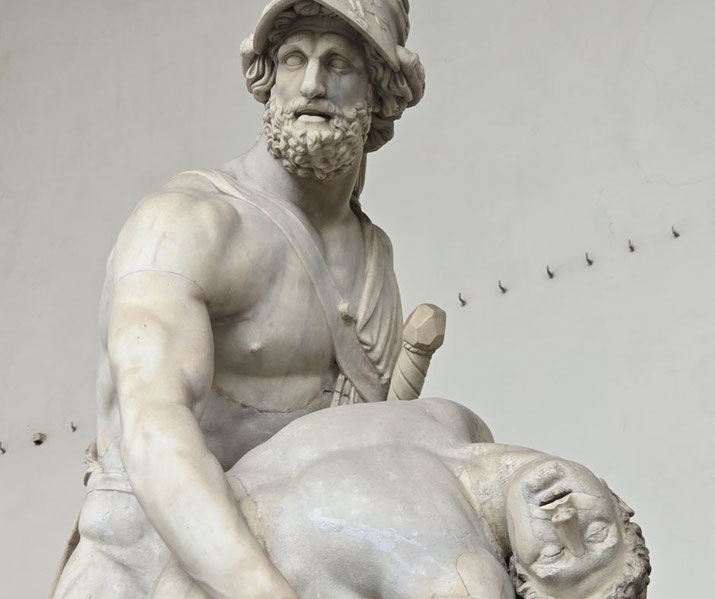What was the Trojan War? Was it real?

The Trojan War is one of the most famous stories in Greek mythology. It tells of how the Greeks launched a massive expedition against the city of Troy in Asia Minor.
According to the myth, this war began when Paris, a prince of Troy, abducted Helen, the wife of Menelaus of Sparta.
As a result, the Greeks assembled a vast army to retrieve her and lay siege to Troy. The story of the Trojan war one of dramatic events, filled with tales of great heroes, gods and goddesses, betrayal, love, sacrifice, and deception, which has captivated audiences for 3000 years.
How do we know about the Trojan War?
The Trojan War is thought to have been inspired by actual events that took place in the late Bronze Age (c.1200 to 1150 BC).
The most famous version of the Trojan War story survives in an epic poem, called the Iliad.
This poem is thought to have been originally spoken orally and transmitted from poet to poet by word of mouth, before being first written around 800 BC by a mysterious person called Homer.
It is not clear who Homer really was, as there is no surviving historical evidence of his existence aside from the Iliad and another poem attributed to him, called the Odyssey.
Nevertheless, ancient people believed that he was a real person: a Greek poet who lived either on the Aegean Island of Chios, or the cities of Smyrna or Colophon, on the west coast of modern Turkey.
However, regardless of whether he existed or not, the Iliad became the version of the Trojan War that most people in the ancient world knew.
The Iliad tells the story of a conflict between the Greeks and the Trojans, which takes place during a ten-year siege of Troy by the Greeks.
Most of the story takes place in the final year of the war, and focuses on the conflict between Achilles and Hector, two of the greatest warriors on either side.
Homer's Odyssey, which was written sometime after the Iliad, tells the story of one of the Greek generals, Odysseus, and his ten-year journey home from Troy.
It includes tales of his adventures with monsters and gods, as well as his encounters with many famous figures from Greek mythology.

The key characters from the Iliad and the Odyssey
There are many characters involved in the broader Trojan War story and it is often hard to keep track of them all.
However, here are some of the most important:
Achilles was the greatest warrior on the Greek side. He was the son of Peleus, king of the Myrmidons, and Thetis, a sea goddess.
As a baby, his mother had dipped him in the mythical river Styx, which made his body invulnerable to harm except for his heel, which didn't enter the river's water, as this was where his mother held him.
This is why we still use the phrase 'Achilles' heel' to describe a person's weak spot.
Hector was the greatest warrior on the Trojan side. He was the son of Priam, king of Troy, and Hecuba, queen of Troy.
Hector was a brave and noble fighter, but he was no match for Achilles.
Odysseus was the king of Ithaca and one of the Greek leaders in the war. He was known for his clever strategies and his ability to outwit his enemies.
Paris was a Trojan prince, son of Priam and Hecuba. He is best known for abducting Helen, wife of Menelaus, king of Sparta, which sparked the war.
Helen was the most beautiful woman in the world. She was married to Menelaus, but she fell in love with Paris and ran away with him to Troy.
Patroclus was Achilles' best friend and his closest companion in the war. He was killed by Hector, which caused Achilles to seek revenge.
Priam was the king of Troy, and father of Hector and Paris. He was a wise and just ruler, but he was no match for the Greeks when they besieged his city.
What caused the Trojan War?
The story of the Trojan War begins with a wedding feast for Peleus, king of Thessaly, and Thetis, a sea goddess.
All of the Olympian gods were invited except for Eris, goddess of discord. Eris was so offended by this that she created a golden apple inscribed "For the fairest," and threw it into the midst of the guests.
Three goddesses claimed the apple: Hera, queen of the gods; Athena, goddess of wisdom; and Aphrodite, goddess of love.
Zeus asked Paris, the prince of Troy, to judge which of the three was the fairest. Paris chose Aphrodite, who promised him the most beautiful woman in the world as a reward.
That woman was Helen, wife of Menelaus, king of Sparta. Paris went to Sparta and abducted Helen, taking her back to Troy.
Menelaus and his brother Agamemnon, king of Mycenae, gathered an army to sail to Troy and rescue Helen.
The Trojan War had now begun.
What happened during the Trojan War?
The war itself is generally believed to have lasted for ten years. The first nine years were spent fighting against the Trojans, without any major breakthrough.
The Greeks were unable to capture Troy because the city had incredibly high and thick walls that were impossible to overcome.
This meant that the conflict went on much longer than expected.
Most of the battles in the Iliad take place on the plains outside the city of Troy, between the Greeks and the Trojans.
The Iliad focuses a lot on the conflict between the Greek warrior Achilles and the Trojan prince Hector.
However, not all was well in the Greek camp. Agamemnon and Achilles had a disagreement, which led to Achilles withdrawing from the fighting in protest.
He said that he would remain in his tent until Agamemnon apologised to him.
Since Achilles was the best warrior in all of Greece, this allowed the Trojans to gain the upper hand.
Seeing the Greeks being defeated inspired Achilles' best friend, Patroclus, to try and improve the morale of his fellow soldiers.
He dressed up in Achilles' armour and charged out to fight. The Greeks, believing that Achilles had returned, were encouraged and followed him.
However, the Trojan hero, Hector, also thought it was Achilles and challenged him to single combat.

Hector successfully killed Patroclus, but when Achilles found out, was so angry that he rejoined the fight and killed Hector.
He then dragged Hector's body behind his chariot around Patroclus' tomb, or in some versions, around the city of Troy itself.
Watching his son's body being treated with such dishonour caused great grief to king Priam, who personally went to the Greek camp to beg Achilles for his son's body.
Achilles was moved by Priam's grief and agreed to return Hector's remains. He also held a grand funeral for Patroclus, during which he made peace with Agamemnon.
However, Achilles did not survive much longer that this either, as he was soon killed by prince Paris, who shot him in the heel with an arrow.
The last part of the Trojan War story is told in the Aeneid by the later Roman poet Virgil and other sources.
According to them, the war came to an end in the tenth year, when Odysseus devised a plan to sneak into Troy.
He instructed the Greeks to build a huge wooden horse, which they left outside the gates of Troy.
The Greeks then boarded their ships and made a show of leaving the shores of Troy forever.
Secretly, however, they had only sailed around the cape, out of view of the Trojans.
The Trojans discovered the wooden horse and thought it was a gift of peace, so they brought it inside the city, not knowing that it was full of Greek soldiers.
That night, the warriors hiding inside the horse came out and opened the gates of Troy, which allowed the rest of the Greek army to enter.
The Greeks then sacked and burned the city of Troy, killing its inhabitants.
What was the real meaning of the Trojan War?
The story of the Trojan War, as told in Homer's Iliad, had a much deep meaning for the ancient Greeks.
It was a story of revenge, glory and death. It also showed the importance of family, friends and community.
In some ways, the Trojan War was a myth for the ancient Greeks to explain natural phenomena, such as storms and earthquakes.
They believed that these were caused by the gods, who were angry about some things that had happened in the human world.
The story of the Trojan War also represented the dark side of human nature, as well as the potential for greatness.
It showed that even the most heroic and noble people could be brought down by their own flaws and weaknesses.
In fact, the Trojan War is the most significant event in all of Greek mythology and was the subject of many works of art, such as paintings, sculptures and plays across both the Greek and Roman world.
Was there a real Trojan War?
If there was a real Trojan War, it is usually thought to have taken place in the late Bronze Age, around 1200 BC.
This was a time when many civilizations in Europe and Asia were collapsing. One theory is that this collapse was caused by a massive volcanic eruption that struck the Greek world around 1250 BC.
It is thought that it caused a tsunami that destroyed much of the coastal settlements in the region and disrupted trade routes.
Most scholars believe that the city of Troy was a real historical location. It was thought that it was a wealthy city located in what is now Turkey.
The modern archaeological site of Hisarlik is believed to be the most likely location of Troy.
However, there is no archaeological evidence for a city being destroyed by an internal attack and a great fire at the end of the Bronze Age, as described in Homer's poem.
This means that the story of the Trojan War may be a myth, or a legend based on historical events.
However, there may be some evidence of a similar event that could have been the inspiration for the story.
In the Troy VI layer of ruins of Hisarlik, there are signs of a violent destruction, including human remains and weapons.
This layer has been dated to around 1200 BC, which is the same time period as the Trojan War.
It is possible that the story of the Trojan War was based on a real event, but it has been exaggerated and embellished over time.
Theories about a real Trojan War
If the site of Hisarlik is the real remains of Troy, and if a conflict did occur at this time in history between the Greeks and the occupants of Hisarlik, then there may have been real reasons for a war as described in the Iliad.
One theory is that it was part of a larger conflict between the Mycenaeans, who lived in southern Greece, and the Hittites, who lived in Asia Minor.
The two cultures may have fought over trading or fishing dominance in the Aegean region.
If so, any conflict may have simply been a series of annual raids on different coastal cities rather than a single, ten-year siege.
Another theory is that the Trojan War was caused by a wide-spread economic downturn, which may have caused an increase in piracy.
As different cultures sought to raid the territories and farmlands of the others, they may have focused on defending a few key cities.
This may explain why there are so few records of the Trojan War; if it did happen, it would have been during a time of great upheaval.
Further reading
What do you need help with?
Download ready-to-use digital learning resources
Copyright © History Skills 2014-2025.
Contact via email
With the exception of links to external sites, some historical sources and extracts from specific publications, all content on this website is copyrighted by History Skills. This content may not be copied, republished or redistributed without written permission from the website creator. Please use the Contact page to obtain relevant permission.





